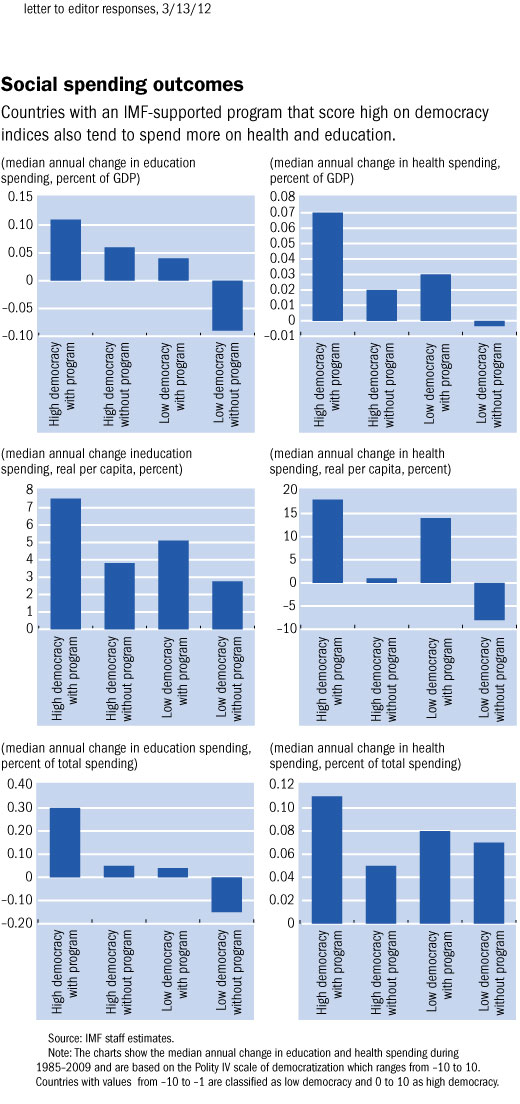Letter to the Editor
Finance & Development
Social spending in poor countries
February 13, 2012
We read with great interest the piece entitled “Are the Critics Right?” by Nozaki, Clements, and Gupta in your December 2011 issue, as well as the Staff Discussion Note it summarizes (SDN/11/15; Gupta et al. 2011). The answer to that question, it appears, is a resounding “no”: IMF programs do not hurt social spending in poor countries, but, rather, reinforce it by bolstering fiscal space. These findings echo those reported by the IEO in their 2003 report on the same topic.
If correct, these findings are welcome news and suggest the IMF has learned from its prior mistakes. We state as much in a 2006 article published in International Organization that revisited the IEO report, and identified the 1997 Guidelines on Social Expenditures as a possible break-point in the effect of IMF programs (this claim is consistent with Gupta et al.’s finding that “spending-to-GDP ratios have accelerated since 2000” (2011: 12)). But, while SDN/11/15 cites our paper (though the F&D article does not), the analysis by Gupta et al. does not address our main finding: that IMF program effects differ by the recipient country’s political regime type, and that the negative effect of IMF programs on social spending is particularly pronounced in developing democracies. Politics matters, and the Fund ignores this inexorable fact of social life to its own detriment.
Sincerely,
Irfan Nooruddin
Fellow, Woodrow Wilson International Center for Scholars, Washington, DC
Associate Professor, Department of Political Science, The Ohio State University, Columbus, OH
Joel W. Simmons
Assistant Professor, Department of Political Science, University of Maryland, College Park, MD
Cited References
Clements, Benedict, Sanjeev Gupta, and Masahiro Nozaki, 2011, “What Happens to Social Spending in IMF-Supported Programs?” IMF Staff Discussion Note No. 11/15 (Washington: International Monetary Fund).
Independent Evaluation Office, 2993, “Evaluation Report: Fiscal Adjustment in IMF-Supported Programs” (Washington: International Monetary Fund).
Nooruddin, Irfan, and Joel W. Simmons, 2006, “The Politics of Hard Choices: IMF Programs and Government Spending,” International Organization, Vol. 60, No. 4, pp. 1001–1033. (Available at http://polisci.osu.edu/faculty/nooruddi/research/nooruddin&simmons2006.pdf)
Nozaki, Masahiro, Benedict Clements, and Sanjeev Gupta, 2011, “Are the Critics Right?” Finance and Development, Vol. 48, No. 4 (December), pp. 50–52.
The authors respond
March 07, 2012
We agree with Professors Nooruddin and Simmons that political regimes can potentially affect social spending. Our results confirm that increases in social spending have been higher in low-income countries scoring higher on indices of democracy (see charts below). At the same time, our results also indicate that increases in education and health spending as a share of GDP, as a share of government spending, and in real per capita terms, have been higher in countries with IMF-supported programs.

We also assessed the effect of scores on democracy in our econometric model, using a formulation similar to that of the 2006 paper of Professors Nooruddin and Simmons that interacts the presence of an IMF program with an index score for democracy. The effect was statistically insignificant on education and health spending as a share of GDP and a share of government spending, except for the effect on health as a share of GDP, where it was positive. Thus, our analysis does not suggest that Fund-supported programs lead to lower increases in spending under democracies.
Sincerely,
Masahiro Nozaki
Benedict Clements
Sanjeev Gupta


